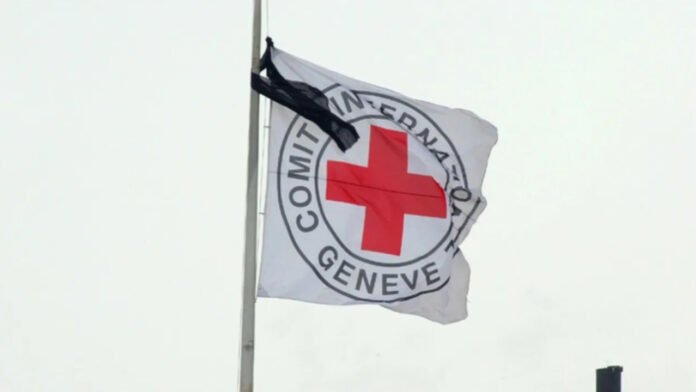A correspondent for Diplomacy magazine in Cairo posed a number of questions to Nesma Nawar, spokesperson for the International Committee of the Red Cross (ICRC) mission in Cairo, regarding the humanitarian situation in the Gaza Strip and the ICRC’s efforts to mitigate the effects of the war on civilians. The correspondent’s interview with the mission’s spokesperson was as follows:
How would you describe the humanitarian situation in Gaza?
The humanitarian situation in Gaza is catastrophic. Six weeks of intense hostilities, combined with a complete blockage of aid for two months, have left civilians without the essentials they need to survive. The renewed hostilities have once again thrown civilians back into uncertainty, chaos, and fear. No one in Gaza feels safe right now. People cannot live their lives with the dignity to which they are entitled. Families live every moment in fear for their children. Civilians are once again digging through rubble, amid smoke and fire, to find their loved ones.
After a year and a half of active hostilities, virtually all the critical infrastructure and essential services in Gaza have been impacted. The healthcare system in Gaza has been at the breaking point for months. Sewage water is spreading around displaced communities – some people who have been displaced more than five or six times. There are little or no sanitation facilities in many places, which is particularly tough for women and parents trying to care for children.
Food stocks cannot be replenished, prices of basic items are increasing, and many people are now completely relying on organization-supported common kitchens to feed themselves and their families. Without being able to replenish food stocks for these common kitchens, they will be forced to begin closing.
The humanitarian response in Gaza is on the verge of total collapse with the continued aid blockage. Without an immediate resumption of aid deliveries, the International Committee of the Red Cross (ICRC) will not have access to the food, medicines, and life-saving supplies needed to sustain many of its programmes in Gaza.
A diplomatic agreement is needed to allow desperately needed aid to reach civilians throughout the entire Gaza Strip. Israel, as the occupying power, must ensure that the basic needs of the civilian population are met. We reiterate our urgent call for the relevant authorities to facilitate the unimpeded flow of aid and the security conditions to safely distribute these supplies.
What are your current services in Gaza?
ICRC’s humanitarian response in Gaza includes supporting people made vulnerable by this conflict to meet basic needs and sustain livelihoods, delivering or enabling emergency medical response and access to clean water and power, bringing families together as well as ensuring dignified treatment of human remains. This happens in close coordination with ICRC’s partners in the International Red Cross and Red Crescent Movement, in particular the Palestine Red Crescent Society (PRCS).
In terms of health response, the ICRC and 14 Red Cross National Societies have combined efforts to open a 60-bed field hospital in Rafah, Gaza, to help address the overwhelming medical needs. Since its opening in May 2024, the Red Cross Field Hospital performed over 80,000 consultations, and the surgical teams performed more than 3,400 surgical procedures.
The ICRC further provided medical supplies, including weapon-wounded kits, wound dressing sets, medicine and emergency medical sets, to 25 local health facilities, Emergency Medical Services providers, and the Ministry of Health.
The ICRC supports six common kitchens, located in various areas of Deir Al Balah and Khan Younis – each kitchen produces hot meals for over 19,200 individuals. It also supports community baking facilities that are present in 15 shelters across Gaza. These facilities provide reliable access to fresh bread for 12,500 displaced individuals each day, with an overall daily production is 70,000 loaves of bread.
The ICRC helped more than 1.5 million people to access clean water by supporting local service providers to provide water, carry out network repairs, and power water wells and desalination plants. It further distributed over 121,000 forensic items, including face shields and body bags, to facilitate dignified management, identification and eventual return of human remains to their families.
The ICRC remains committed to serving civilians in Gaza, but rapid and unimpeded humanitarian access is critical to fulfilling this mission.
Tell us more about the facilitation with the Egyptian authorities since the start of the crisis.
Since the escalation of the conflict in October 2023, the ICRC in Cairo has been working closely with the Egyptian authorities, particularly in view of Egypt’s prominent role and mediation efforts aimed at alleviating the suffering of the civilian population in Gaza.
Egypt has played a crucial role in facilitating the delivery of humanitarian aid through the Rafah crossing prior to its closure. The Egyptian Red Crescent (ERC), our main humanitarian partner in Egypt, has also been instrumental in responding to the humanitarian crisis in Gaza. We have been working closely with them to address the most urgent humanitarian needs.
Since the onset of the crisis, the Egyptian authorities and the ERC have supported ICRC operations in Gaza by facilitating the movement of our staff and the transport of ICRC assistance through the Rafah crossing. We are deeply grateful for their continued support.
In 2024, in partnership with ERC, the ICRC delivered 10,200 tons of essential assistance – through the Rafah crossing – to address the dire needs in Gaza.




